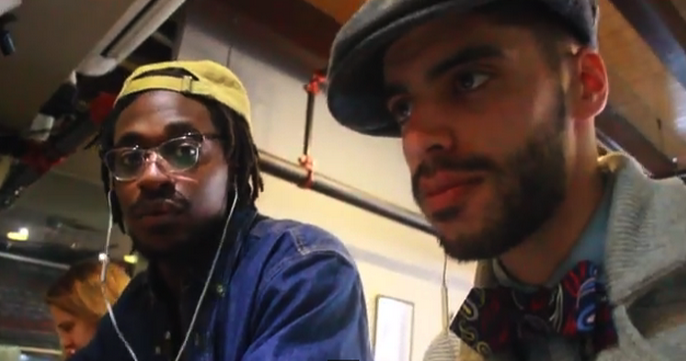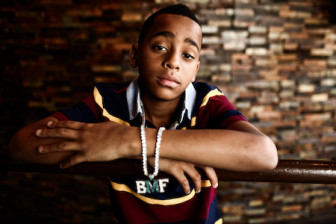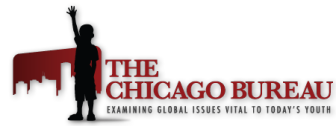
Behind the scenes footage of the "Mouse Trap" production. Brooklyn Poet Shane Romero and Boston Videographer Cliff Notez.
Premiering Tuesday, Mouse Trap is an independent, anti-gun violence poetry short film directed by Cliff Notez and written and performed by poet and performing artist Shane Romero. Inspired by the rhymes of a 14-year-old Chicago rapper named Li’l Mouse, the film focuses on the South Side of Chicago and Brooklyn and was released online at 5 p.m.
Poet Shane Romero joined us to share his insight and experiences with the film.
Chicago Bureau: Tell us about your short film, Mouse Trap.

Lil Mouse’s violent raps inspired the anti-gun short.
Romero: Mouse Trap is a poetry short film and the main focus of the poem and film is to stop gun violence, particularly here in the brown and black communities. The target of the film is South Side Chicago and my neighborhood of Brooklyn, and the poem that narrates the short film is directly addressed to a 14-year-old rapper named Li’l Mouse.
CB: Why address the film to Li’l Mouse in particular?
Romero: Li’l Mouse is an up-and-coming rapper from South Side Chicago. He is getting fame through World Star Hip Hop and other media online, and all of his raps are glorifying gun violence. He talks about him shooting people, all of his friends being shooters, and misogyny upon women.
CB: What else inspired you to make the film?
Romero: I’ve had to deal with a bunch of friends and family members being murdered. I’m surrounded by it [gun violence], especially in my neighborhood. Brooklyn is the most bloody borough in all of New York City and so the amount of gun violence that we have here, particularly in my neighborhood and surrounding neighborhoods, is just overwhelming. That was a major inspiration to address all of us in these communities that are being plagued by the … gun violence.
CB: Tell us about your childhood with violence in Brooklyn.
 Romero: Growing up, times were really rough coming through the ‘90s and early 2000s. I lost a really close friend at 16. I think it was the first time I really had to see someone that I was really close to being lost. It’s been all around me. Crime has been surrounding my neighborhood for so long, it’s almost become normal.
Romero: Growing up, times were really rough coming through the ‘90s and early 2000s. I lost a really close friend at 16. I think it was the first time I really had to see someone that I was really close to being lost. It’s been all around me. Crime has been surrounding my neighborhood for so long, it’s almost become normal.
CB: Why focus on Chicago?
Romero: Well, Chicago being the murder capital of the United States, I just feel that so many people have given up on the gun violence problem there in Chicago that they don’t know how to fix it. What’s coming out of Chicago’s rap scene right now is all glorifying the gun violence going on there.
CB: Why do you think these two cities (Brooklyn and Chicago) in particular are so violent?
Romero: With Chicago, they had knocked down all the projects and the city’s forcing everybody to the Southside neighborhoods, so you have mixtures of gangs going to the South Side of Chicago who are against each other and they’re now living across the street from each other. And it’s so easy to get guns in Chicago. That’s the main reason here.
Within Brooklyn, the poverty level that we have in my neighborhood and everyone just trying to find a way to make it, has unfortunately resorted to gun violence. It’s become a point to where, “Shoot first, ask questions later,” and I feel that it’s become systematic for us to automatically think that guns are going to be our first choice to go to. It’s definitely due to poverty and everybody being so stuck close together and on top of each other within the projects and apartment buildings. I think that all feeds into our community.
Also, lack of mentorship. Both [cities], particularly as brown and black men, we lack so much mentorship that I feel we’ve lost our ways … to solve situations without guns.
CB: Why did you use poetry in this film instead of shooting a straight documentary?
Romero: I do poetry for a living. I tour around the world doing spoken word, so it was natural instinct to automatically write a poem. We felt it was a very innovative way to approach this.
I think it’s going to reach people very well. They’re now seeing someone who looks like them. They’re seeing someone who lives in their neighborhood. I’m of my environment but I’m not a product of my environment. We’re young men of color, so we’re not just someone with a camera who’s never been in these neighborhoods, who’s never experienced it.
CB: What do you hope to accomplish with this film?
Romero: Our goal is to definitely start putting a dent in the gun violence in our neighborhoods and on a global scale. This is not a problem just in Brooklyn, Chicago. This is a problem in New Orleans, this is a problem in Houston, in Los Angeles, and so our goal is to really get in and start mentoring and showing people in our neighborhoods, in any neighborhood, that there’s other solutions. And even on a global scale and in other countries.
CB: What are some alternatives to violence for young people?
Romero: It all depends on the situation. Taking someone’s life is never the answer, because both people on either end of the gun are losing. Someone’s going in the ground and someone’s going in jail. We just got to find solutions, whether it’s going out to mentor them and taking them to boys and gals rec centers or finding them jobs or teaching them about higher education. Not everyone has to become a poet or rapper. We can become doctors and lawyers. So I think occupying these kids’ minds with positivity is something that will stop the gun violence. In these neighborhoods, we’re told so much that we’ll never amount to anything.
CB: What’s next for you and this project?
Romero: Definitely within my tours as a poet to speak about the issues that are going on and me and Cliff Notez, the director, have a campaign called Shooting for Excellence. We have lectures on gun violence, we have workshops that teach kids to prosper, so we teach different art mediums, whether it be poetry or visual arts, but it teaches them about higher education, self-identity and gun violence prevention. We’re going to be taking that around the U.S. and we’re looking internationally to help make an impact on helping kids live and put the guns down.
Pingback: Rates of violence, physical bullying against children drop significantlyBig Online News | Big Online News